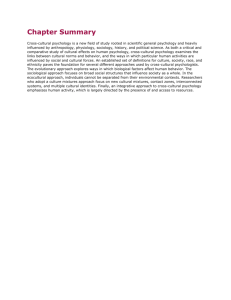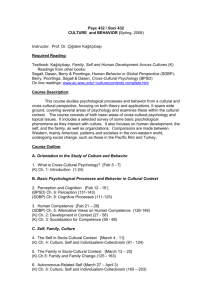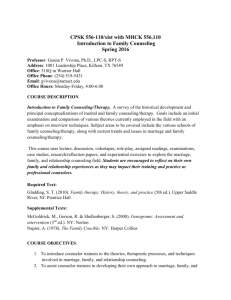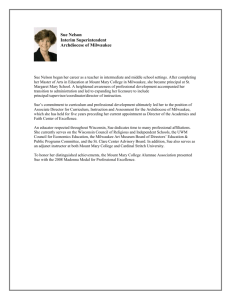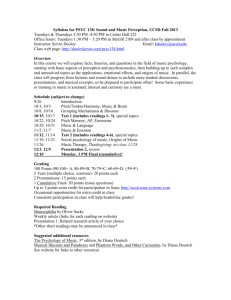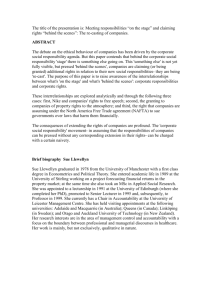The syllabus is still under construction
advertisement
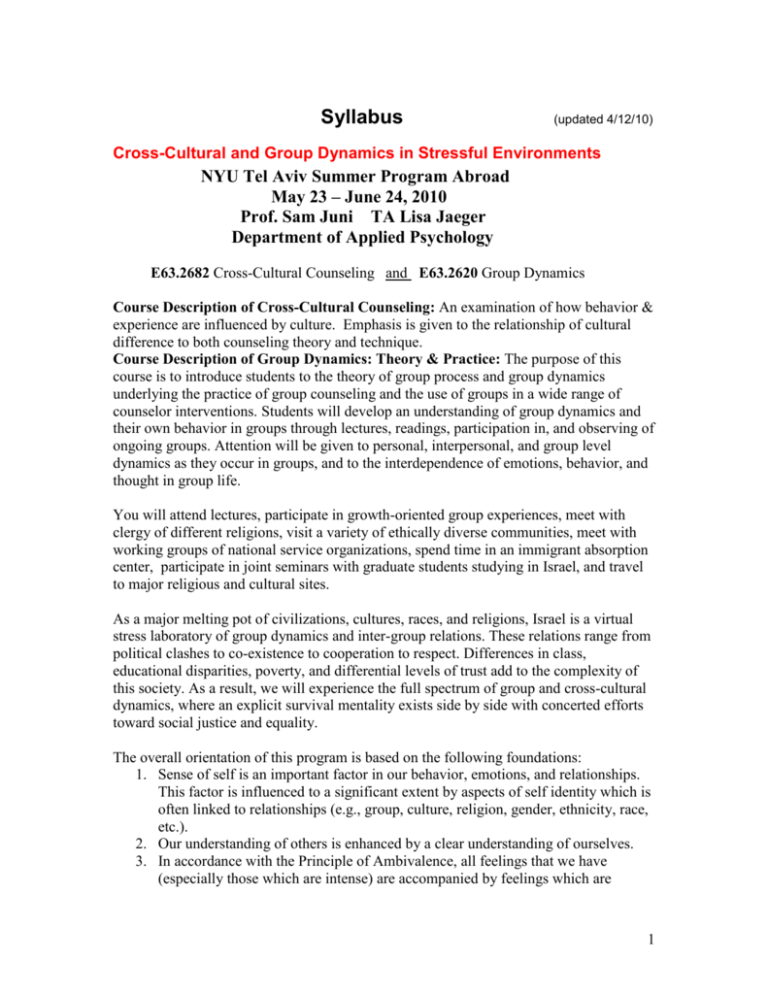
Syllabus (updated 4/12/10) Cross-Cultural and Group Dynamics in Stressful Environments NYU Tel Aviv Summer Program Abroad May 23 – June 24, 2010 Prof. Sam Juni TA Lisa Jaeger Department of Applied Psychology E63.2682 Cross-Cultural Counseling and E63.2620 Group Dynamics Course Description of Cross-Cultural Counseling: An examination of how behavior & experience are influenced by culture. Emphasis is given to the relationship of cultural difference to both counseling theory and technique. Course Description of Group Dynamics: Theory & Practice: The purpose of this course is to introduce students to the theory of group process and group dynamics underlying the practice of group counseling and the use of groups in a wide range of counselor interventions. Students will develop an understanding of group dynamics and their own behavior in groups through lectures, readings, participation in, and observing of ongoing groups. Attention will be given to personal, interpersonal, and group level dynamics as they occur in groups, and to the interdependence of emotions, behavior, and thought in group life. You will attend lectures, participate in growth-oriented group experiences, meet with clergy of different religions, visit a variety of ethically diverse communities, meet with working groups of national service organizations, spend time in an immigrant absorption center, participate in joint seminars with graduate students studying in Israel, and travel to major religious and cultural sites. As a major melting pot of civilizations, cultures, races, and religions, Israel is a virtual stress laboratory of group dynamics and inter-group relations. These relations range from political clashes to co-existence to cooperation to respect. Differences in class, educational disparities, poverty, and differential levels of trust add to the complexity of this society. As a result, we will experience the full spectrum of group and cross-cultural dynamics, where an explicit survival mentality exists side by side with concerted efforts toward social justice and equality. The overall orientation of this program is based on the following foundations: 1. Sense of self is an important factor in our behavior, emotions, and relationships. This factor is influenced to a significant extent by aspects of self identity which is often linked to relationships (e.g., group, culture, religion, gender, ethnicity, race, etc.). 2. Our understanding of others is enhanced by a clear understanding of ourselves. 3. In accordance with the Principle of Ambivalence, all feelings that we have (especially those which are intense) are accompanied by feelings which are 1 inconsistent with them. These feelings pull individuals and relationships in opposite emotional and relational directions simultaneously. 4. Process analysis often yields a more profound understanding of interpersonal (or group) behavior than content analysis. 5. The determinants of behavior and emotions are often psychodynamic, and not necessarily understood by the individual who employs common sense or intuition. 6. The understanding of individual and group behavior may be enhanced by examining defense mechanisms. 7. Interpersonal and Group conflicts are usually related to different perceptions or interpretations rather than to actual facts and “truths.” 8. The analysis of a group or culture is distinct from, and not reducible to, the specific behavioral or emotional characteristics of its individual members. 9. Interpersonal and Personality Dynamics become exaggerated under stress. Stressful environments are therefore more conducive to study and understand cross-cultural and group psychology. 10. Resolution of conflicts is often enhanced by mutual understanding. Sometimes such understanding engenders empathy. The scope of course coverage will be similar to those of our local courses, with the addition of field visits and guest lectures. Our syllabus represents the combined textbooks and readings that we use for the two courses on the Washington Square Campus. We will be adding articles and readings that are relevant to the specific cultures and groups we will be studying in Israel. The course structure consists of lectures, presentations, experiential groups, and site visits. We are trying our best to give the students off on Fridays, Saturdays, and Sundays. Students who wish to use their weekends to augment their academic learning will have opportunities to visit recommended groups and attend appropriate functions. In Israel, each student will be required to keep a log and make entries for each guest presentation, community visit, and group encounter. Besides the notes on communities and groups we visit, the logs will also include process summaries of our own experiential group. Some of our site visits and our presentations will focus on inter-culture and inter-group tension, with a particular stress on self and group identity issues. We will study these phenomena by hearing from individuals who have “crossed-over” across group and cultural divides, as well as from individuals and groups that actually straddle memberships across a divide which is usually seen as a solid boundary. We will encounter some of these cross-overs in groups of religious converts, groups consisting of couples who are intermarried across religious and ethnic lines, and religious groups who blend aspects from two religions into a religion of their own. Our aim during this summer is not to resolve – or even fully understand -- the political and social conflicts we will encounter. We will, however, consider various questions which might allow us to conceptualize these problems. We will explore the perspectives 2 of postmodernism and social constructionism as possible approaches to social relations and inter-group differences. Throughout the lectures and presentations, we can therefore expect to encounter and debate the following questions: Is there a logical and rational approach to deal with differences among people? Is absolute truth a meaningful concept in defining history, sociology, psychology, and human relations, and is it a useful notion in conflict resolution? Can bigotry, prejudice, fascism, and racism be clearly defined? Are there absolute criteria to define identity, sense of self, class, race, gender, religious affiliation, and political orientation? Are the concepts of relativism and uncertainty – which have become part of contemporary physical sciences – important to our understanding of the social sciences? To what extent is fundamentalism shaped by facts and objective historical truths? Israelis live with politics. Although each of us, as individuals, may have political views or convictions, politics is not part of our focus or agenda in this program. Nonetheless, we will certainly be encountering direct and indirect political messages in each of our site visits and from each presenter. Here is our approach for the program: We want to be informed about the basic issues, since many of our learning experiences will often be embedded in political contexts. We are therefore including a weekly newspaper in our readings. Let’s be clear, however, that in order to facilitate learning and to avoid distractions, we will attempt – as best we can – to keep our class discussions tailored to our program objectives. We will definitely avoid political debates and discussion in class (although you will certainly get involved with them outside of class – Israelis love to debate politics with anyone who will listen). We will be using various scales and measures to get in touch with our own internal dynamics as well as with our orientation and biases toward others. The exposure to different religions and cultures will allow us to study similarities and differences between biases linked to xenophobia or homphobia (among others) and those based on religion and ideology. A major premise of this program is that behavior and experience are influenced by culture and group identification. Our rationale of including Cross-Cultural Counseling as an integral component of intervention confirms the position of APA that our professionals must be proficient in the nuances of providing services to people from culturally diverse backgrounds. Program Objectives: To understand theoretically and experientially key concepts in cross-cultural and group dynamics To develop keen sensitivity to basic identity parameters (including gender, religion, class, culture, race, and ethnicity – among others) in others and in one’s own self, and to realize the repercussions of these parameters on personal and interpersonal interactions To develop counseling intervention techniques which incorporate the course constructs To achieve competence in analyzing group dynamics and process 3 To master different theoretical approaches in group intervention To incorporate diversity into the student’s understanding of others To begin developing group leadership skills This program is methodologically designed to teach theory and skills in a manner which enhances the student’s capacity to understand and effect changes in groups and individuals across cultural, religious, and ethnic divides. We will encounter situations and issues that are controversial, distressing, and emotionally challenging. This will often result in students stepping out of their “comfort zone.” Such emotional reactions may be stressful, and are part of our learning experience. The class structure is set up to offer students a secure context for learning and selfdiscovery. The absolute rule for our conduct throughout the program is that we support each other and treat both fellow students, presenters, and those we meet at site visits and discussion with respect, whether their opinions or ideology are consistent or inconsistent with our own. Respect for diversity: Full effort will be made to present material and activities that are respectful of sex, sexual orientation, disability, age, socio-economic status, ethnicity, religion, race and culture. Program Requirements Attend class sessions, experiential groups, lectures, and site visits. Read required textbooks, class materials, and handouts. Read the English-language edition of the Jerusalem Post or Ha’aretz weekly (available each weekend). Participate as a leader/co-leader of our experiential sessions. Participate (with another student) in presentations to the class about a specific culture. Complete written assignments. These include one main paper for Group, one main paper for Cross-Cultural, and a running Log, which includes your reactions and notes about our experiential group session, guest presentations, and the cultures / communities we visit. Successfully complete the final exam. All papers and exams must be written at the level of a graduate student. All papers must be proof-read and be grammatically correct to be accepted. Unacceptable papers will be returned to be rewritten. Participation: Attendance and participation in class activities, site visits, and discussions are required. Arrangements made in advance for specific absences (including “mental health day”) will, of course, be accommodated as feasible. Lectures: The readings assigned are at the appropriate level of our students. Lectures are not intended to review readings. Instead, they will elaborate points and go beyond the readings. However, there will be time in class to discuss (or ask questions) about the readings. 4 Log: In Israel, each student will keep a log and make concept-based entries for guest presentations and community visits. Importantly, the logs will also include process summaries of our own experiential group. These will include: 1. What you learned from the experience. Can this information be generalized? 2. The implications of this knowledge for theory and practice. 3. References to specific readings. 4. Your feelings about the experience (if any). Sub-Group Presentation to the class about a specific culture: Students will subdivide into sub-groups to present to the class about a specific culture. These can be found in our texts as follows: African American Sue 11 Diller 11 Women Sue 18 Latino Sue 14 Diller 9 People with Disabilities Sue 19 Native American Sue 12 Diller 10 Asian American Sue 13 Diller 12 Sexual Minorities Sue 16 Multi-Racial Sue 15 White Sue 9 Diller 13 The Elderly Sue 17 Getting Started Early: Students should read the Rosenthal book during the Spring. Students are also strongly encouraged to read Diller (1-4, 6) and Gladding (3, 6, 7) during the Spring. You will then choose a particular culture AND a particular group. The culture can be the student’s own culture-of-origin or a particular culture the student gets to know. Likewise, the group can be one the student happens to belong to or a particular group the student gets to observe and know. You will then begin to construct two separate analytic papers, according to key theoretical concepts based on the readings. It is strongly recommended that both of these papers be outlined, researched, and actually written before you leave for Israel. You will, of course, regularly edit and augment your papers during the program as you gain a more sophisticated understanding of the material. However, having both of the papers close to completion (even if changes are being made) will allow you to concentrate more freely on the full richness of our learning experience. Required Main Paper for Each Course The written analysis of the culture is required for the Cross-Cultural Counseling course. You will research the professional literature for descriptions of the culture, as well as the unprofessional popular literature for its colloquial stereotypes. You will then present the culture you have studied based on the key concepts in the Diller chapters. The written analysis of the group is required for the Group Dynamics course. As an introduction, it will include a basic description of the group and its social context. You 5 will then analyze the group structure, the group processes, and the relationships among its members according to the key concepts in the Gladding chapters. Each paper should be no more than 10 pages, typed, double spaced, and appropriately referenced, using the following as a guide. 1. Group Description or Culture Description Provide a one-paragraph summary describing either... a. the type of group, composition and population variables, how long the group has been meeting, and other relevant information to describe this group b. the culture and its characteristics (based on the literature). 2. Cross-Sectional Analysis Describe the following, in detail, with specific behavioral observations to support your statements: Cohesiveness: Degree, level, how it is maintained, factors that contribute to level of cohesiveness, etc. Norms: What are they? Which are explicit and which are implicit? Power: What are the power/driving factors to enforce the norms within the group or culture? Leadership: Describe the leadership of the group or culture. For the group paper, describe how leadership developed, and how impacts group development. Motivational Processes: What are the goals of the group or the culture? How did they develop? How are decisions made? Role Differentiation: Describe the roles of the members. How do these roles develop? What are the problems confronting the group or culture that led to these roles? What is the stability of the arrangement of interpersonal relationships? Additional Properties: Other processes or features or nuances you observe. Include references to any of the keywords (which listed at the end of the syllabus) which may be relevant. 3. Personal Observations State any personal thoughts, feelings, and lessons learned as a result of this observation or analysis. All written assignments throughout the program (including the two major papers and the Logs) should include the following elements: Racism vs. prejudice vs. bias Personal experiences with the type of phenomena you are writing about Racial, gender, cultural, and other stereotyping Final Exam will consist of Short Answers (definitions & examples) based exclusively on the Keywords and Key Concepts (listed at the end of this syllabus). Grading for each course will be based on the Main Paper (40%), the Logs (20%), the Group Presentation (10%), and the Final Exam (30%). Academic Integrity and Plagiarism: 6 All papers and exams must adhere to the NYU Steinhardt’s policies on academic integrity (http://steinhardt.nyu.edu/policies/academic_integrity ). We are obligated to acknowledge (and properly cite) information derived from others. We may only take credit (explicitly or implicitly) for ideas and work which is truly our own. We may download information and copy material from any book, article, or other media ONLY if we put all of the material in quotes and give an exact citation of the source. Policy on plagiarism (presenting someone else's work as one's own) is outlined in the Student Handbook. It is your responsibility to be aware of the policy. If you require any clarification, please see the TA or the professor. Special Accommodations & Academic Assistance: Arrangements will be made for anyone with a disability that requires accommodation. You must discuss any specific issues with the instructor. Students can also contact Services for Students with Disabilities (998-4980). Every attempt will be made to allow each student to demonstrate his/her best effort. In addition, NYU has a Writing Center if you are having difficulty writing papers. However, it is solely your responsibility to inform the instructor of accommodations needed prior to class. We do our best to accommodate religious observance and cultural preference. Meals served at the Guest House are certified Kosher and meet Halal dietary standards. There are houses of worship of all denominations in Tel Aviv, and students may attend services without conflicting with the program schedule. Student grievances: Students with complaints or suggestions should discuss their concerns with the TA and instructor as a first step. If the complaint is not resolved to the student's satisfaction, the student should approach the Director of the Counseling Program at NYU, and then the Chair of the Department of Applied Psychology. Cross-Cultural Readings Required Texts: 1. Diller, J. V. (2006) Cultural Diversity: A Primer for the Human Services. 3rd Edition. Wadsworth Pub Co. 2. Sue, D.W. & Sue, D. (2007) Counseling the culturally diverse: Theory and Practice. 5th Edition. Wiley & Sons. ISBN: 0-471-41980-X 3. Rosenthal, D. (2008). The Israelis (paperback edition). Free Press. 4. Harvard's Implicit Association Test. Online Link. Optional additional readings (others to be added on Blackboard): Keller, B. & Correspondents of The New York Times. (2005). Class matters. New York: Times Books. Shipler, D.K. (1997). A country of strangers: Blacks and Whites in America. New York: 7 Vintage Books, a division of Random House, Inc. (Paperback) Williams, P.J. (1998). Seeing a color-blind future: The paradox of race. New York: Noonday Press. Davis-Coehlo, K, Waltz, J., & Davis-Coehlo, B. (2000). Awareness and prevention of bias against fat clients in psychotherapy. Professional Psychology: research & Practice, 31, 682-684. Gilbert, L.A. (1999). Reproducing gender in counseling and psychotherapy: Understanding the problem and changing the practice. Applied & Preventing Psychology, 8, 119-127. Hilman, J., & Stricker, G. (2002). A call for psychotherapy integration in work with older adult patients. Journal of Psychotherapy Integration, 12, 395-405. Knapp, S. & VandeCreek, L. (2007). When values of different cultures conflict: Ethical decision making in a multicultural context. Professional Psychology: Research & Practice, 38, 660-666. Langhout, R.D. (2005). Acts of resistance: Student (in)visibisity. Culture & Psychology, 11, 123-158. Laureau, A. (2000). Social class and the daily lives of children: A study from the United States. Childhood, 7, 155-171. Leary, K. (1997). Race, self-disclosure, and “forbidden talk”: Race and ethnicity in contemporary clinical practice. Psychoanalytic Quarterly, 66, 163-189. Lowery, B.S., Knowles, E.D., & Unzueta, M.M (2007). Framing inequity safely: Whites’ motivated perceptions of racial privilege. Personality & Social Psychology Bulletin, 33, 1237-1250. Luthar, S. S., & Latendresse, S. J. (2005). Children of the affluent: Challenges to wellbeing. Current Directions in Psychological Science, 14, 49-53. McIntosh, P. M. (1998). Writing privilege and male privilege: A personal account of coming to correspondences through work in women’s studies (Working Paper No. 189). Wellesley, MA: Wellesley College Center for Research on Women. Plante, T.G. (2008). What do the spiritual and religious traditions offer the practicing psychologist? Pastoral Psychology, 56, 429-444. Olkin, R. (2002). Could you hold the door for me? Including disability in diversity. Cultural Diversity & Ethnic Minority Psychology, 8, 130-137. 8 Schlosser, L. Z. (2003). Christian privilege: Breaking a sacred taboo. Journal of Multicultural Counseling & Development, 31, 44-51. Schneider, M. S., Brown, L. S., & Glassgold, J. M. (2002). Implementing the resolution on appropriate therapeutic responses to sexual orientation: A guide for the perplexed. Professional Psychology: Research & Practice, 33, 265-276. Smith, L. (2005). Psychotherapy, classism, and the poor: Conspicuous by their absence. American Psychologist, 60, 687-696. Sue, D. W., Capodilupo, C.M., Torino, G.C., Bucceri, J.M., Holder, A.M.B., Nadal, K.L., & Esquilin, M. (2007). Racial microaggressions in everyday life: Implications for clinical practice. American Psychologist, 62, 271-286. Women’s Issues in Orthodox Jewish Divorce: The Chained Woman Syndrome. Links: http://www.youngisraelrabbis.org.il/divorce.htm http://www.youngisraelrabbis.org.il/prenup.htm Group Dynamics Readings (Additional articles to be posted on Blackboard) 1. Gladding, S. T. (2008). Groups: A Counseling Specialty (Fifth Edition). Merrill. 2. Toman, W, (1993). Family Constellation: Its Effect on Personality and Social Behavior (Fourth Edition). NY: Springer. Structure of Group Dynamics Classes Each class will be divided into two sessions. 1. The first session will combine a Seminar format with lecture elaborations of key points (didactic and experiential). 2. The second session will be an experiential group, either a whole group or a partitioned group using the fishbowl technique. Groups will be led by the instructor and /or the TA (some with class members as co-leaders) or by class members. Participation in experiential groups is required, but will not be evaluated. Our experiential sessions will be planned out in detail during lectures, each oriented toward one of the following modalities: Psychodynamic, TA, Birth Order, Behavioral, Gestalt, and Psychodrama. This will make us familiar with the practical aspects of running these groups. The Guidelines for the types of Groups we will be conducting are to be found in: Gladding Chapter 15 Psychoanalytic section only Gladding Chapter 15 TA Section only Toman Book Adlerian Birth Order Approach Gladding Chapter 17 Gestalt section only 9 Gladding Chapter 17 Psychodrama section only Students who are uncomfortable participating in the experiential group should seriously reconsider whether they should be specializing in disciplines that stress interpersonal psychology. If you are such a student and stay in the course, be sure to discuss specific accommodations and alternatives with the instructor so that you do not feel coerced into doing class activities you are unwilling to do. 10 Due Dates Topics Covered Pre-Program Readings (Before you arrive to Israel) Readings Due Diller 1-4, 6 Gladding (3, 6, 7) Rosenthal Book Selected Harvard IAT Exercises (online) May 23 Arrival, Settling in, Orientation May 24 Politics of Intervention Sue 3 May 25 Types of Group Work Gladding 2 May 26 May 27 Trust Issues in Multicultural Intervention Sue 4 Group Dynamics Gladding 3 Key Players in Family Groups Toman 1, 2 May 31 Subtle Bias Factors: Microaggressions Sue 5 June 1 Group Leadership Gladding 4 Effects of Family Changes Toman 3 June 2 Multicultural Counseling Barriers Sue 6 June 3 Beginning a Group Gladding 5 Personal, Social, Cultural Family Factors Toman 4 June 7 Culture-Specific Intervention Strategies Sue 7 June 8 Norming & Storming Gladding 6 Partners as Dyads Toman 6 Racial & Cultural Identity Development Sue 10 June 9 11 June 10 Working Stage of the Group Gladding 7 Friendship as Grouping Factor Toman 7 Social Justice Intervention Orientation Sue 12 Changing Organizations & Groups Sue 20 Termination Stage of the Group Gladding 8 Parental Relationships across Cultures Toman 8 June 16 White Racial Identity Development Sue 11 June 17 Ethical Issues Gladding 9 June 14 June 15 Interactive Styles based on Sibling Position Toman 11 June 21 Multicultural Family Intervention Sue 8 June 22 Cultural Diversity in Groups Gladding 10 June 23 FINAL EXAM June 24 Both Main Papers Due. TERMINATION CEREMONY Pack up & Departure Day Please do not ask the TA or Professor to review with you what you missed if you are absent. Instead, ask your colleagues for the homework, handouts, and notes. Clearly, there is no way to make up for lost group experiences and the required reaction notes. Housing Accommodations & Activities Students will stay in double occupancy rooms at a modern, convenient Tel Aviv guest house. Two meals are served daily. Tentative co-curricular activities Visiting major religious and cultural sites. Interviews and visits with displaced / immigrant communities. Field visit and interviews at an absorption center. Joint seminar sessions with Israeli graduate psychology students. 12 Interviews with Arab groups in Yafo and the Galil. Presentations by various clergy and cultural liaisons Yad Vashem Tour and Lecture on Racism Optional Cross-Cultural & Group Interviews We are setting set up arrangements with various groups throughout Israel which students may want to study. They will be available by appointment. These include (as of now): 1. Olam Qatan Cross-Religious Mystical Seminar. Location: Jerusalem. Unified Study Group of Jewish Chassidic and Muslim Sufi members. Contact person: Ya’qub ibn Yusef, info@olamqatan.com, 02 563 7507. 2. Samaritan Religious & Cultural Community: Holon. 3. BGLT Queer Group. Location: Tel Aviv. Contact Person: Eyal Ben-Ami, Tel Aviv University, eyal40@netvision.net.il. 4. Karaaite Synagogue and Clergy Representatives. Location: Ashdod. 5. Bilingual Arab-Jewish Kindergarten, staffed by American Graduate Students. Location: Be’er Sheva. Special Supplies & Clothing Needs Warm climates present a risk of dehydration, especially for visitors. You will need a water bottle with you at all times. Some of the road-stops we will be using on trips may not meet Western standards. You should have a supply of tissues and germicides (like Purell) on you at all times. You will need to bring along a modest “costume” which will be suitable for our visits, meetings, and presentations at some of the very traditional communities and religious groups. Men will need a cap and long dark-colored pants. Women will need to be dressed in a manner that only their hand and faces are exposed. Women should therefore bring the following loose-fitting and opaque clothing with “subdued colors” (definitely not red, yellow, or orange): a kerchief, a skirt which at least covers the knees (preferably longer), a jacket, shirt, or blouse which is long sleeved and extends up to cover the collar bone, and socks or opaque stockings which are at least knee high. Safety Our program and itinerary will adhere to the safety guidelines established by the State Department of the United States and the NYU Office of Public Safety. Enrollment and Technical Program Details can be found at http://steinhardt.nyu.edu/study_abroad/programs/groupdynamics 13 Keywords and Key Concepts (Note: These are essential for all written assignments and should be incorporated into your logs.) Groupthink & Conformity General Systems Theory – opposed to Linear Causality Group Types: Task, Psycho-educational, Counseling, Psychotherapy Yearbook Feedback Open Ended vs. Closed Ended groups Primary Affiliation vs. Secondary Affiliation groups Hawthorne Effect Contagion Universality Consensual Validation Family Reenactment Subgrouping Law of Triviality Roles Heterogeneous Group Collision Role Problem Incompatibility Role Problem Confusion Role Problem Transition Role Problem Avoiding Conflict Psychic Numbing Meaning Attribution Narcissistic Groups Executive Function Group Skills: Active Listening, Restating, Clarifying, Summarizing, Questioning, Interpreting, Confronting, Goal Setting, Suggesting, Protecting, Self Disclosure, Modeling, Dealing with Silence, Blocking, Terminating Group Skills: Facilitating, Protecting, Blocking, Linking, Diagnosing, Reality Testing, Delegating, Traffic Directing, Modeling appropriate behavior Leadership: X, Y, Z Cutting Off Shifting the Focus Subgroups Co leading Models: Alternate, Share, Apprentice Drawing Out Using Eyes Manipulators Holding the Focus Tying Things Together Resistors Attacking the Leader 14 Monopolizers Silent Members Sarcasm Analyzers Focuser on Others Assistant Leaders (self appointed) Group Cohesion Microaggression Diagnostic Racism All of the Defense Mechanisms we cover in class Drawing Out Power: Informational, Influential, Authoritative Intellectualizing Questioning Advice Giving Band Aiding Dependency Scapegoating Using a Process Observer as Consultant Leveling Competing Accommodating Avoiding Collaborating Compromising Group Norming Her-and-Now Self Disclosure Johari’s Window Rounding Role Playing Brainstorming Nominal-Group Technique Confrontation Feedback Termination Emotional Ambivalence Farewell Party Syndrome Cultural Identity Oppression Power Priviledge Class Ideology Empathy Punctuation Bias 15
